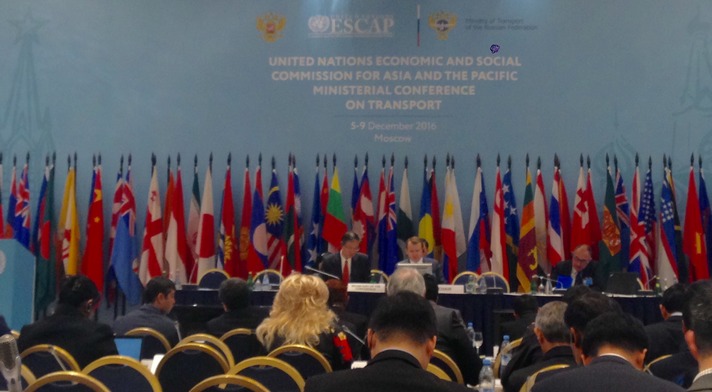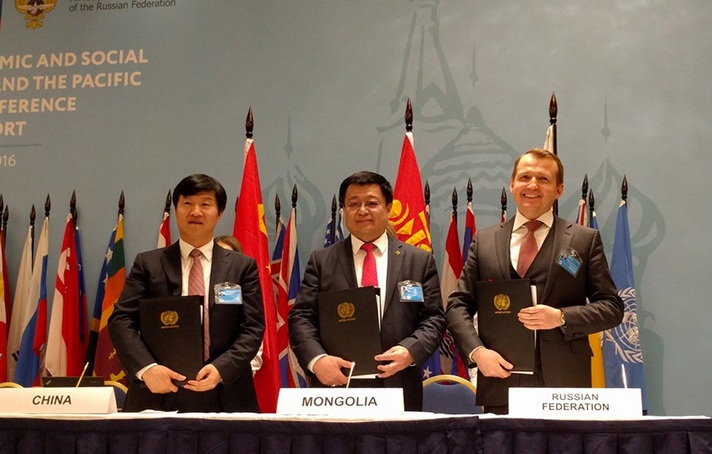The Third session of the Ministerial Conference on Transport of ESCAP took place in Moscow
December 15, 2016

The Third session of the Ministerial Conference on Transport of Economic and Social Commission for Asia and the Pacific (ESCAP) took place in Moscow from 5 to 9 December, 2016. The Ministerial Conference on transport has been organized every 5 years since 1985, the present one being the seventh in the row. This year the conference was hosted by the Government of Russia, represented at the event by the Ministry of Transport of Russia. The goal of the conference was to discuss the future policy directions for regional transport development. The Ministerial conference comprised two segments: first, a senior official segment from 5 to 7 December; and second, a ministerial conference on 8 and 9 December 2016. The conference was attended by the delegations from the member-states of ESCAP, international organizations such as World Customs Organisation, ILO, European Commission, UNIDO, representatives of the Russian private sector.
As before, this year the Ministerial Conference had a very busy agenda. The program included two important goals: first, to discuss and assess the implementation of the Regional Action Programme for Transport Development in Asia and the Pacific, Phase II; secondly, to consider and adopt a new regional action programme for sustainable transport connectivity in Asia and the Pacific, phase I. In addition, within the first segment the participants have discussed seven topics related to tendencies in the transport sector in regard to the Sustainable Development Goals and the 2030 Agenda.
Director of the Transport Division of ECSAP Yuwei Li noted that the Conference shall give a new impetus to transport development and facilitate transport cooperation in the region. Presently, a whole number of projects of development of regional transport infrastructure are under implementation in Asia and the Pacific (development of transport corridors East-West and North-South in Azerbaijan; development of the Middle Corridor of the new Silk Road in Turkey; development of rail connection between Iran and China, etc.). The main focus of the transport policy in the region is the development of international intermodal transport corridors which shall integrate land-based transport and enhance the transport connectivity in the region.
Another important aspect of transport development in the region is energy efficiency and environmental sustainability. Transport is currently one of the biggest emitters of greenhouse gases and consequently important factor of climate change. In this regard, member-states of ESCAP have expressed their commitment to build the efforts to make the transport industry more energy-efficient in respective countries, increase the share of ecologically sustainable transport and fuel so as to reduce emissions of greenhouse gases. The social aspect of transport development in the region was also given attention to within the conference. Chairman of the Asian Institute of Transport Development K. L. Thapar pointed to the fact that the lack of access to transport in remote regions is often one of the reasons of persisting poverty and slacking development. This is why in formulating transport policy, governments shall consider not only commercial goals, but also think about providing equal access to transportation for everyone. The representative of the International Labour Organisation Alejandra Ross emphasized the need to ensure social security and equal opportunities for everyone employed in the transport sector.

Economic and Social Commission for Asia and the Pacific is one of the five regional commissions of the Economic and Social Council of the United Nations. The Commission comprises 53 member-states with the total population of 4.1 billion people and with a geographical scope that stretches from Turkey in the west to the Pacific island nation of Kiribati in the east, and from the Russian Federation in the north to New Zealand in the south. This makes ESCAP the most comprehensive of the United Nations five regional commissions, and the largest United Nations body serving the Asia-Pacific region.

